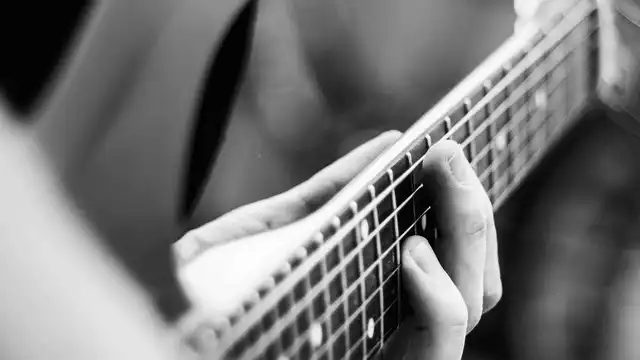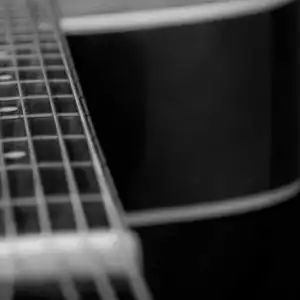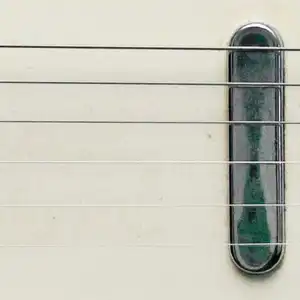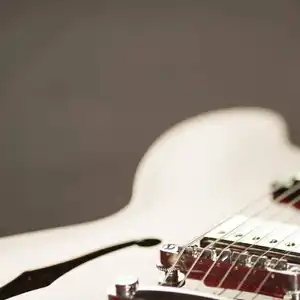Why Do Guitar Strings Lose Intonation as They Age?


Be sure to subscribe to our YouTube channel to keep up with more great videos like this one.
TRANSCRIPTION
So follow me here... You get a new set of strings, you put them onto your guitar. You're a good guitarist, so you adjust every single thing about your guitar, you get it playing just right. You move your saddles around so that your intonation is perfect (meaning when you fret the 12th fret you're neither sharp nor flat relative to the open pitch). So then you play on that same set of strings for a month or two or three, they still sound pretty good to you but once you start fretting things up high you notice that the intonation is somehow pulled out a little bit. Well, today we're going to talk about what's going on here, why it is that strings will lose their intonation as times goes on, and we're going to talk a little bit—at a layman's level at least—about what's happening with the materials of the string that causes it to lose its intonation over time.Some basics first...
So first off let's lay a bit of theoretical groundwork for what we're talking about here. In physics, if we were talking about a string theoretically we would be talking about it as being completely uniform across its entire length. The core wire inside would have the same diameter across its entire length and the wrap wire would be applied with the exact same amount of torque or compression at the exact same angle relative to the core wire, so that the space between each wrap is exactly the same throughout the entire string length. And on this theoretical dream string that we have imagine here, if you set the intonation on it and nothing ever changed it would just continue to intonate perfectly. Unfortunately, in the real world things do change. Even if you start with a guitar string that is that perfect, over time it's going to morph and shift and as a result it's going to perform differently.So what's really going on here?
Over the course of a string's life all of the stresses and strains it encounters and all the sweat gunk, and dirt that it accumulates takes its toll, and over that time that string will change a little bit. This could be little things like that string getting kinked or ground down around a fret. It could be just the string becoming a little bit uneven as it's elongated constantly, or just developing a lot of microcracks, which occur from being constantly fatigued—even when it's not going past enough pressure for the string to break, it's still wearing to down a little bit. Over the course of time all of these different factors add up to make your string uneven over the course of its length. Even if it started out perfectly even it's not going to be that way by the end of its life. For example, you'll have a lot more sweat on your strings across fretboard than you will at the area that's not over the fretboard, as just one example. The result of all this is that instead of looking for the resonance of a perfectly uniform string across the entire length of the scale, in the real world you have a string that has some thicker points, or some more worn down points, so it resonates a little bit unevenly, and that string is going to intonate differently at different positions on the fretboard than a string that is perfectly uniform. So this, by the way, is the reason why you always set your intonation with a new set of strings, because you're ideally not going to have any of those issues that can happen over time effecting it and you'll be setting it to the proper point to get the ideal intonation. But over time no matter what strings you're using these sorts of problems are going to cause it to not intonate well at the 12th fret or really any other fret for that matter.What about coated strings?
One thing that's interesting to me is that people talk about coated strings and treated strings as though they last forever—and in some ways they have certain advantages over uncoated strings in terms of longevity—however, things like this where we're talking about fatigue of the actual metal or change in the shape of the actual metal around the frets, well, things like that are still going to happen to coated strings. The metal itself is still undergoing the exact same stress and strain as an uncoated string, coating be darned. As a result, your coated strings—even though they might sound good to you well into six months of playing—are still going to lose intonation eventually. On every guitar that might happen a little differently—it's not to say that the coated strings on your guitar sound terrible and you don't know it or anything like that—but this same thing will happen at the exact same rate with coated strings as it will with uncoated strings.An additional note about round core strings...
Now round core strings, in contrast to hexagonal core strings like lot of the ones we make (we do make some round core strings as well), can cause some additional trouble in this regard. Because the wrap wire is not as well bound to the core wire, over time you not only have all those other things to worry about , but you also have the potential for the wrap wire to separate slightly from the core wire and change its position relative to its core (this is a bit hard to put into words, but basically the wrap wire can slide around on the core, which is not good). So round core strings can cause even more trouble with intonation over the long haul than hex core strings, so that's one thing to keep in mind too if you're utilizing round core strings, it's sort of just a reality with that more vintage style of string. Editor's Note: With bass strings this is actually less of a concern since the multiple layers of wrap wire help to anchor the inner wraps. Additionally, if the string is properly flattened at a point past the guitar's scale and installed properly with a sharp kink, there's less to worry about here.What does this mean for you?
Does this mean that you have to change your guitar strings every month or every two months? No, not at all. I keep strings on my own guitar sometimes for eight, nine, even ten months—partly because I like to see how they wear in at different points there, but partly because I can. Really it comes down to how much of a priority things like perfect intonation are for you. For some guitarists, it drives them absolutely insane to not have the intonation perfect at the 12th fret, for other guitarists it's not as big of a deal or they can't even really hear that much of a difference. So as always, it's all about finding out what's right for you. But the thing that I think is most interesting about this topic and one of the reasons I'm glad somebody wrote me an email about it and sparked this blog post, is that good strings, bad strings, coated strings, uncoated strings, they all run the risk of the same thing happening. The core metal itself—the high carbon steel—unless it's become aged prematurely with one company versus another, it's going to undergo the same fatigue, and it's going to react fairly similarly to that fatigue over time, whether that be the frets themselves or the microcracks that form from bending it over and over again. Regardless of the quality of strings you have or how much you love a particular brand of strings, this is something that your guitar is always going to be susceptible to.A question to wrap up...
All right, so since we're talking about intonation, today's question is going to be related to a guitarist that I think always has very good intonation, and that is the Edge. The reason I say that is because he's using digital delays that don't have a ton of modulation on them, he's playing way up at the 12th fret, and despite that you don't hear these weird warbles or out of pitch elements to his sound at all. It always sounds dead on. So I want to know down in the comments what your very favorite Edge riff is. For me it was always that Where the Streets Have No Name dotted delay part, I absolutely love that part. And as always, if you have any questions about intonation or anything like that let us know down below—we're always here to help.Other Posts you may like

Guitar Strings Order: How the Guitar is Tuned and Why

Two Handed Tapping: Our Top 8 Tappers of All Time

Which Guitar Strings Wear Your Fret Wire Down More?

What is Nashville Tuning? Its History, Best Guitar Strings & Uses

Guitar Scale Length Explained: String Tension & Playability

What Guitar Strings I Used To Play...
0 Responses
Leave a Reply
Your email address will not be published. Required fields are marked *

